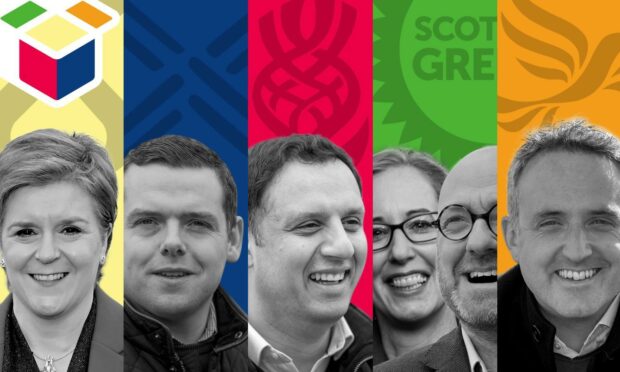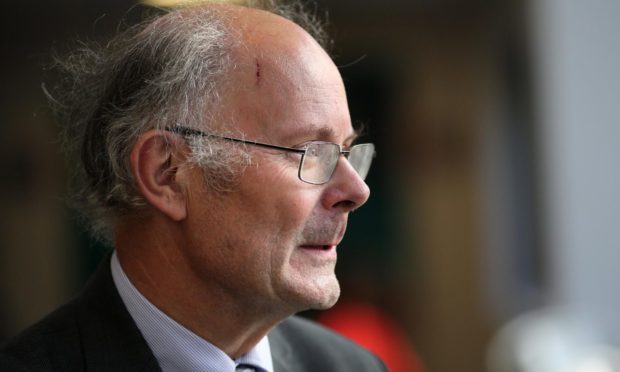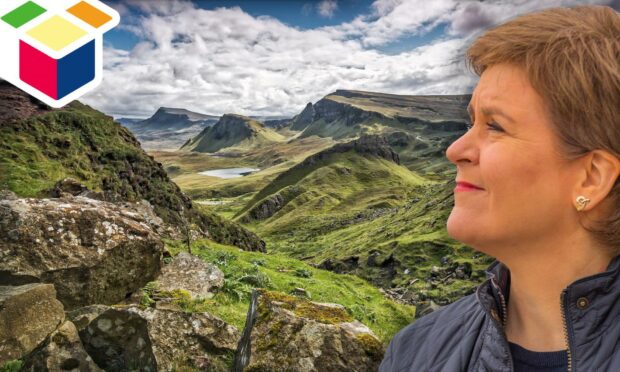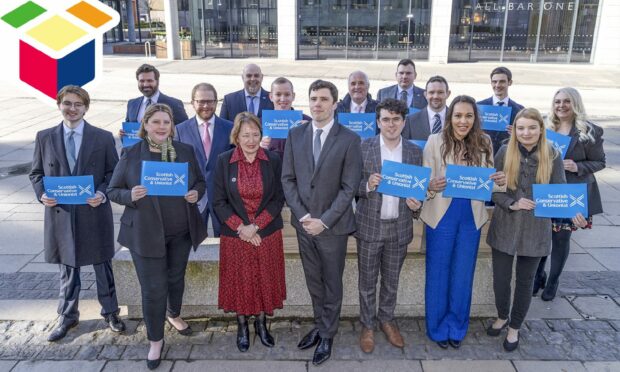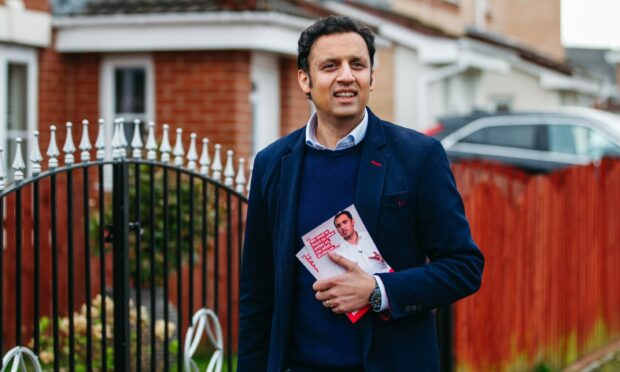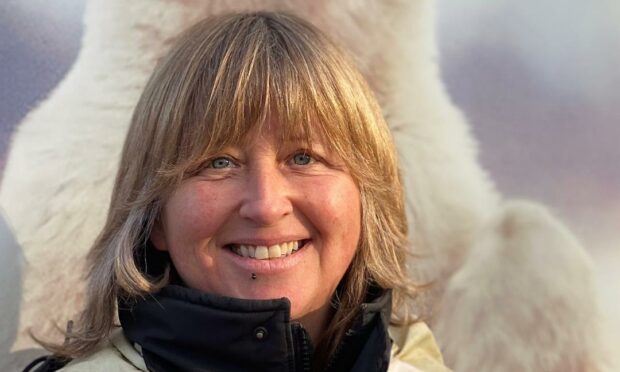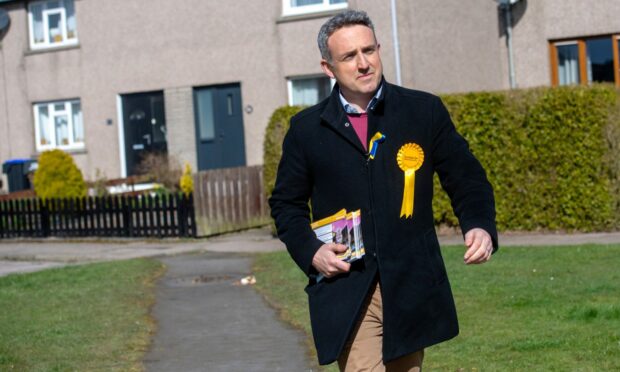Voters could usher in some major political changes with local and far reaching consequences at the council elections on Thursday.
For many people this is a chance to set the dial for vital public services from schools to refuse collections.
But for others, the decision comes down to the state of each political party nationally – the ‘partygate’ outrage engulfing Boris Johnson, and the independence push from Nicola Sturgeon.
With so much at stake, we asked leading polling expert professor Sir John Curtice to help us assess each party’s fortunes before ballots are cast on May 5.
His predictions include:
- A surprise for the independent group on Highland Council with the SNP poised to make gains.
- The SNP could remain the largest party at Aberdeen City Council while Labour might leapfrog the Tories to second place.
- A struggle for the Scottish Greens to make an impact in the north-east.
- A tough fight for the Scottish Liberal Democrats to advance in the Highlands and Aberdeenshire.
Here’s our run down with Sir John on how the parties stand on the final day of the campaigns.
SNP: A Highland surprise?
The latest polling nationally shows the SNP are on course for a comfortable victory on May 5 yet their position is no higher now than it was five years ago.
Sir John says this year’s poll “may be the first election where independents are not the largest group” at Highland Council.
The polling expert puts this down to a fall in independent candidates and potential advances from the SNP.
The current administration is made up of Independent, Labour and Liberal Democrat councillors, with the SNP and Tories in opposition.
Analysis by the Ballot Box Scotland website shows the total number of independent candidates dropped from 357, from a peak figure of 691 in 2012.
Sir John said: “I think the question in the Highlands is whether the independents are still the largest group or whether the SNP might race ahead.
“The Tories will probably fall back but that’s part of the wider story and Labour might recover.
“Labour lost five of the eight seats that they had before 2017 so they’ve got the odd bastion of local strength that they might recover from their losses.
“Highland may be the first election where independents are not the largest group.”
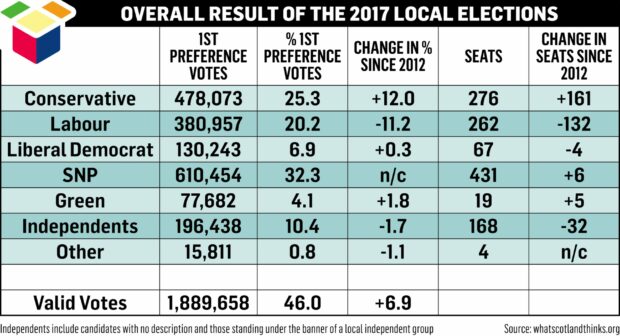
The SNP is hopeful of seizing control in Aberdeen where it returned the largest group of councillors in 2017 although not enough for an outright majority.
Sir John said the “SNP should remain the largest party” in the city after putting up 23 candidates for election this year.
But the polling expert added it remains to be seen whether the party “gaining another seat or two will be enough to make it very difficult for the unionists to keep them out of the administration in the way they were able to do last time”.
He continued: “But that will depend on the bargaining thereafter.”
Conservatives: Can Douglas Ross withstand ‘partygate’ flak?
The Tories face perhaps the toughest task at the ballot box with some voters likely to be put off by Boris Johnson.
Every poll of Holyrood and Westminster constituency vote conducted since the revelations broke just before Christmas has put the Conservatives behind Labour.
The party had something of a resurgence in the last council elections in 2017, winning a total of 11 seats in Aberdeen to become the second largest party behind the SNP.
They will be hoping for a strong showing again in the Granite City where they have been in administration with Labour and the Independent Aligned Group since 2017.
Their vocal support for the oil and gas industry could bear fruit here where more than 65,000 people are employed in the sector.
The time round they are fielding 17 candidates across the city – their largest cohort “in decades” – and hope to make gains again.
The Tories are currently the biggest group at Aberdeenshire Council where they are in administration with the Liberal Democrats and a group of aligned independents.
The party will be hoping the Downing Street party revelations do not put a significant dent in their vote share there, where they are fielding 33 candidates.
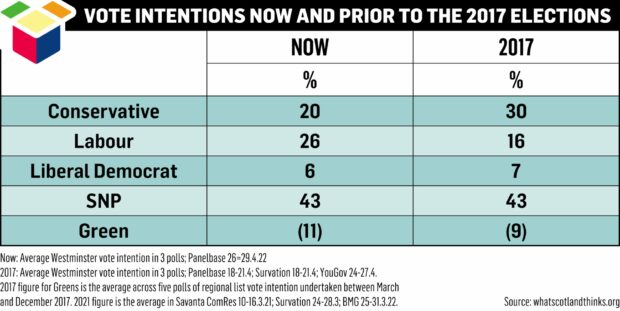
Nationally, the party nearly doubled its share of the first preference vote to 25% in the last council elections in 2017.
However, Sir John said the “Tories are defending a very high baseline” across Scotland, having nearly doubled their share of first preference votes in 2017.
He added: “They were always going to struggle to defend that high baseline. Since Christmas, since partygate, every poll in Scotland has put the Tories in third place”.
Labour: Back to second place?
Labour have their sights set on leapfrogging the Tories to become the second most popular party in Scotland.
This is mostly thought to be down to the impact of ‘partygate’ in attracting the support of those disaffected with Boris Johnson and their handling of the affair.
But Sir John said Labour’s current average rating of 26% for Westminster vote intentions is still no more than the 27% it won in the 2017 UK general election.
He added: “We are, it seems, still some way away from a significant Labour revival.”
All eyes will be on Aberdeen after 2017’s election drama which saw nine Labour councillors suspended from the party after entering into coalition with the Tories.
This handed the party the reins to take forward many of its election pledges, despite coming third in the polls and almost halving their councillors.
Party leader Anas Sarwar has already ruled the party out from working with other parties in a “formal coalition” which could set councillors on a collision course with their national party.
Sir John said the question in Aberdeen is “whether or not Labour can overtake the Tories”.
The party is fielding a total of 14 candidates across the Highlands, where it hopes to build on its current three but where it previously had more than double that.
Broadcaster and journalist Tom Morton was automatically elected for Labour in Shetland North – making his victory the first for the party in this election.
There were no Labour councillors in the local authority in the current session.
Greens: Can they make gains in the north?
In two thirds of wards the SNP will face competition from the Greens for the support of Yes voters.
They may benefit from increased exposure at a Scottish Government level after a power-sharing deal was struck with the SNP last year.
It might work against them in areas such as the north-east where some oppose the party’s stance on oil and gas.
Sir John says that even if there is “some leakage” from the SNP to the Greens, some of these same voters may still give a second preference to the SNP.
This could eventually help select an SNP candidate in some wards across Scotland.
The Greens are pushing for their greatest ever return of candidates to Highland Council, buoyed by the election of their first ever Green councillor there in 2017.
The party has already got one new councillor – Andrew Baldrey – elected in the north of the country after only three candidates came forward for the three member ward of Caol and Mallaig.
However, Sir John said the Greens are disadvantaged by the single transferable voting system for local elections being “designed to keep them out”.
Unlike at Holyrood, they would need at least 15% in first preference votes, significantly higher than the proportion they got in the last council elections in 2017.
He continued: “The Greens are doing relatively well in the polls at the moment – they are doing somewhat better than they were five years ago – so some kind of green advance yes but they got 4% in the first preference vote last time.
“So the question is – outside of Glasgow and Edinburgh – can they at all do well enough to do more than pick up the odd seat?
“If they could get enough first preference votes to remain in the count then they’d probably start picking up second preference votes from the SNP but at the moment I suspect it will work in the other direction.”
Liberal Democrats: More than ‘treading water?’
The Liberal Democrats hope to make gains in Aberdeenshire and the Highlands, where they have historically done well.
Party leader Alex Cole-Hamilton predicts a Tory collapse, claiming voters are “absolutely scunnered” with the partygate scandal.
He made election campaign visits to target areas the Highlands and Aberdeenshire over the last few weeks .
The MSP told the Press and Journal he is “really optimistic about growth in the Highlands”, following two by-election wins last year.
They also want to see a good result in Aberdeenshire, where Liberal Democrat councillors are currently in administration with the Tories and independents.
Sir John said: “In terms of the national position they’re more or less treading water.
“Broadly speaking they will probably hang on to what they’ve got but seem unlikely to make much of an advance.
“Although of course they ought to be profiting from some of the Conservative difficulties, whether they will or not, we’ll have to wait and see.”
